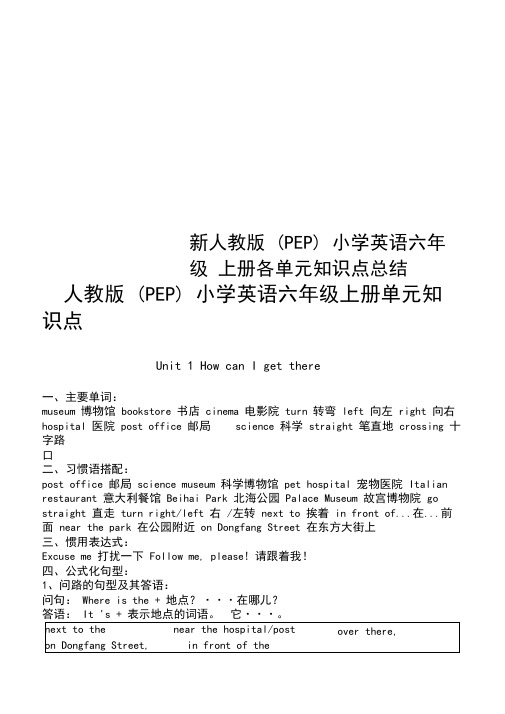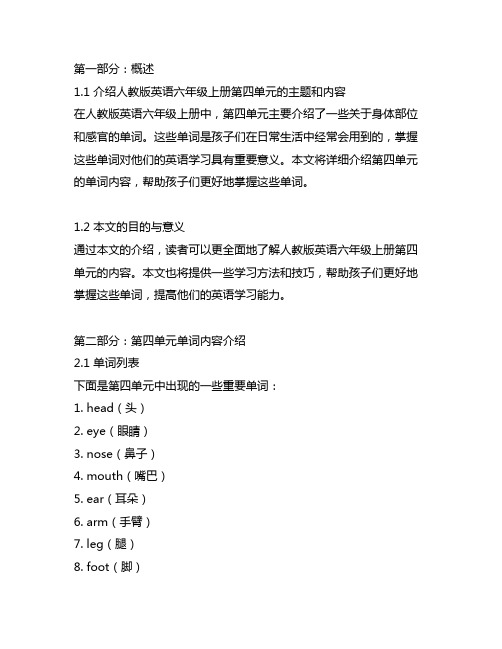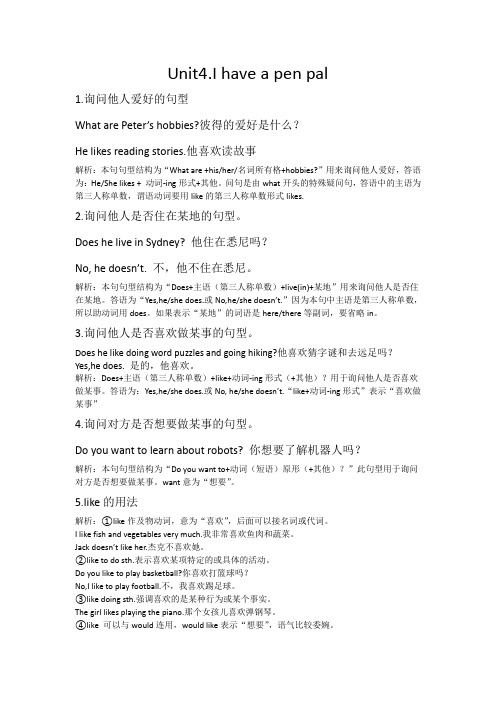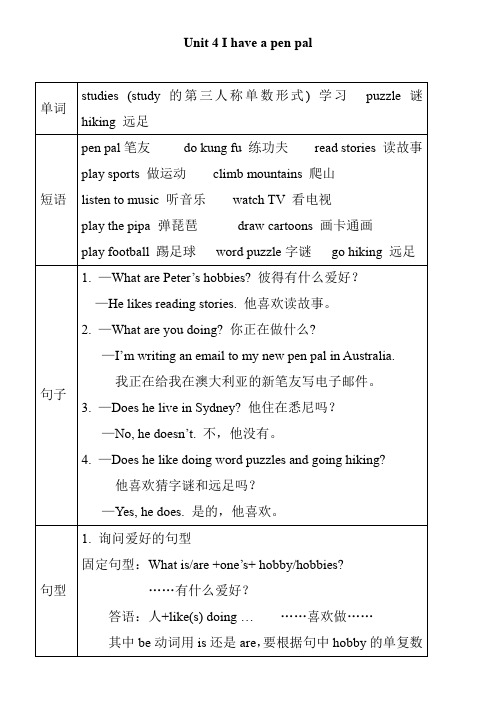人教PEP版小学英语六年级上册Unit 4 知识点总结(讲义式)
新人教版(PEP)小学英语六年级上册各单元知

新人教版 (PEP) 小学英语六年级上册各单元知识点总结人教版(PEP) 小学英语六年级上册单元知识点Unit 1 How can I get there一、主要单词:museum 博物馆bookstore 书店cinema 电影院turn 转弯left 向左right 向右hospital 医院post office 邮局science 科学straight 笔直地crossing 十字路口二、习惯语搭配:post office 邮局science museum 科学博物馆pet hospital 宠物医院Italian restaurant 意大利餐馆Beihai Park 北海公园Palace Museum 故宫博物院go straight 直走turn right/left 右/左转next to 挨着in front of...在...前面near the park 在公园附近on Dongfang Street 在东方大街上三、惯用表达式:Excuse me 打扰一下Follow me, please! 请跟着我!四、公式化句型:1、问路的句型及其答语:问句:Where is the + 地点?···在哪儿?答语:It 's + 表示地点的词语。
它···。
2、询问怎么到某地的句型及其答语:问句:How can +主语+ get (to)+地点?···怎么到···?同义句型:Can you tell me the way to + 地点?Where is + 地点?Which is the way to + 地点?答语:Turn +方向+表示地点的介词短语。
···转。
at the cinema at the corner near the post office...五、例句:Where is the cinema, please? 请问电影院在哪里?It ' s next to the hospital. 它与医院相邻。
人教版英语六年级上册第四单元单词

第一部分:概述1.1 介绍人教版英语六年级上册第四单元的主题和内容在人教版英语六年级上册中,第四单元主要介绍了一些关于身体部位和感官的单词。
这些单词是孩子们在日常生活中经常会用到的,掌握这些单词对他们的英语学习具有重要意义。
本文将详细介绍第四单元的单词内容,帮助孩子们更好地掌握这些单词。
1.2 本文的目的与意义通过本文的介绍,读者可以更全面地了解人教版英语六年级上册第四单元的内容。
本文也将提供一些学习方法和技巧,帮助孩子们更好地掌握这些单词,提高他们的英语学习能力。
第二部分:第四单元单词内容介绍2.1 单词列表下面是第四单元中出现的一些重要单词:1. head(头)2. eye(眼睛)3. nose(鼻子)4. mouth(嘴巴)5. ear(耳朵)6. arm(手臂)7. leg(腿)8. foot(脚)2.2 单词意义和用法head(头)是人体的一部分,用于容纳大脑和其他主要感觉器官。
eye(眼睛)、nose(鼻子)、mouth(嘴巴)和ear(耳朵)是人体的感官器官,分别用于观察、嗅觉、口腔感觉和听觉。
arm(手臂)、leg(腿)和foot(脚)是人体的运动器官,用于进行各种日常活动。
第三部分:学习方法与技巧3.1 记忆方法通过与伙伴或家人一起练习,可以加深对这些单词的印象。
你可以让家人或朋友给你做一个小测验,让他们用英语命令你摸哪个部位。
这样不仅可以帮助你记忆单词,还可以增进你和家人朋友之间的交流。
3.2 语境运用在日常生活中,可以通过观察自己和他人的身体部位来运用这些单词。
当你看到父母帮助你妹妹擦嘴巴时,你可以用英语说:“Mom is wiping her mouth for my sister.”这样可以提高语境运用的能力,使单词更加活学活用。
第四部分:总结本文通过介绍人教版英语六年级上册第四单元的单词内容,并提供了一些学习方法和技巧,希望能够帮助孩子们更好地掌握这些单词。
通过不断地练习和运用,相信孩子们一定能够轻松地掌握这些单词,提高他们的英语水平。
六年级英语上册(PEP版)Unit 4必备知识点

六年级英语上册(PEP版)Unit 4 l have a pen pal必备知识点六年级英语上册(PEP版)Unit 4 "I have a pen pal"的必备知识点主要包括以下几个方面:一、重点单词和短语1. pen pal:笔友2. hobby:爱好3. dancing:跳舞(动词ing形式)4. singing:唱歌(动词ing形式)5. reading stories:读故事6. playing football:踢足球7. doing kung fu:练功夫8. cooking Chinese food:烹饪中国食物9. studying Chinese:学习汉语10. doing word puzzles:猜字谜11. going hiking:去远足12. idea:主意13. lives in:住在……(后接地点)14. on a farm:在一个农场里15. write an email to:给……写封电子邮件16. on the playground:在运动场上二、重点句型1. 询问某人的爱好:What are sb's hobbies? 某人的爱好是什么?(sb's表示某人的,hobbies是hobby的复数形式)He/She likes reading stories and singing. 他/她喜欢读故事和唱歌。
注意:在回答时,如果主语是第三人称单数,like要变为likes,动词要用其ing形式。
2. 一般疑问句:Does he/she live in +某地? 他/她住在某地吗?肯定回答:Yes, he/she does.否定回答:No, he/she doesn't.Does he/she like doing sth.? 他/她喜欢做某事吗?肯定回答:Yes, he/she does.否定回答:No, he/she doesn't.3. 表达想要做某事:Do you want to +动词原形(+其他)? 你想要做某事吗?例如:Do you want to learn about robots? 你想要了解机器人吗?4. 征求意见:Shall we +动词原形(+其他)?我们……好吗?例如:Shall we dance? 我们跳舞好吗?三、语法点1. 动词的ing形式:用于表示正在进行的动作或习惯、爱好等。
人教版小学六年级英语上册Unit 4知识点

人教版小学六年级英语上册Unit 4知识点重点语法:1、动词变为动名词的规则:动词变为动名词,即是动词加ing。
一般要遵循以下三条规则:(1)一般情况下,在动词的后面直接加ing。
如:play-playing read-reading do-doing go-going(2)以不发音的字母e结尾的动词,要去掉不发音的字母e,再加ing。
如:write-writing ride-riding make-making dance-dancing(3)以单元音加单辅音结尾的重读闭音节,要双写最后一个辅音字母,再加ing。
如:run-running swim-swimming put-putting sit-sitting2、记住like后面要加动词ing,说爱好有三种说法:①I like swimming.②Swimming is my hobby.③My hobby is swimming.注意:She likes drawing pictures, listening to music and making kites.这几个爱好是并列的,都是在like后面,所以都要加ing.3、第48页是写自己或者笔友的作文模板4、第49页是写自己或者是其他人一天的作文模板,记住要用一般现在时态。
4、关于第三人称单数:动词变为第三人称单数形式的规则:(1)在一个句子中,如果主语人称既不是你,也不是我,而是另外的一个人,这时的人称叫做第三人称单数。
(2)在第三人称单词的句子中,动词要使用第三人称单词形式。
(3)动词变为第三人称单数形式,要遵循以下规则:①一般情况下,在动词的后面直接加s。
如:read--reads make-makes write-writes②以字母s, x, o , sh , ch结尾的动词,在词尾加es。
如:do-does wash-washe teach-teaches go-goes pass-passes③以y结尾的动词分为两个情况,以元音字母加y结尾的动词,在词尾直接加s。
PEP版小学英语六年级上册U4-单元知识汇总课件

单元知识汇总
重点词汇
(一)四会词汇 1.dancing 跳舞 3.reading stories 读故事 5.doing kung fu 打功夫 7.studies Chinese 学习中文 9.goes hiking 去远足
2.singing 唱歌 4.playing football 踢足球 6.cooks Chinese food 煮中国菜 8.does word puzzles 玩字谜
lives in the USA now.He likes playing basketball very much.He often goes hiking with his friends, too.I often write an email to him.
4.A: Does he like reading stories? B: Yes, he does./No, he doesn’t. 5.A: Does Mr Li teach English? B: No, he doesn’t.He teaches maths.
重点语法 I have a pen pal.His name is Jason.He is 13 years old.He
(二)相关旧词汇 1.your你的;你们的 3.her 她的 5.our 我们的 7.watches TV 看电视 9.on the farm在农场
2.his 他的 4.their 他们的;她们的;它们的 6.teaches Chinese songs 教中文歌曲 8.has English class 上英语课
(三)三会词汇 1.pen pal笔友 3.jasmine茉莉 5.Canberra堪培拉 7.shall表示征求意见 9.joiidea想法;主意 6.amazing令人惊奇的 8.goal射门 10.club俱乐部
最新人教版英语六年级上册第四单元知识总结

Unit4.I have a pen pal1.询问他人爱好的句型What are Peter’s hobbies?彼得的爱好是什么?He likes reading stories.他喜欢读故事解析:本句句型结构为“What are +his/her/名词所有格+hobbies?”用来询问他人爱好,答语为:He/She likes + 动词-ing形式+其他。
问句是由what开头的特殊疑问句,答语中的主语为第三人称单数,谓语动词要用like的第三人称单数形式likes.2.询问他人是否住在某地的句型。
Does he live in Sydney? 他住在悉尼吗?No, he doesn’t. 不,他不住在悉尼。
解析:本句句型结构为“Does+主语(第三人称单数)+live(in)+某地”用来询问他人是否住在某地。
答语为“Yes,he/she does.或No,he/she doesn’t.”因为本句中主语是第三人称单数,所以助动词用does。
如果表示“某地”的词语是here/there等副词,要省略in。
3.询问他人是否喜欢做某事的句型。
Does he like doing word puzzles and going hiking?他喜欢猜字谜和去远足吗?Yes,he does. 是的,他喜欢。
解析:Does+主语(第三人称单数)+like+动词-ing形式(+其他)?用于询问他人是否喜欢做某事。
答语为:Yes,he/she does.或No, he/she doesn’t.“like+动词-ing形式”表示“喜欢做某事”4.询问对方是否想要做某事的句型。
Do you want to learn about robots? 你想要了解机器人吗?解析:本句句型结构为“Do you want to+动词(短语)原形(+其他)?”此句型用于询问对方是否想要做某事。
want意为“想要”。
5.like的用法解析:①like作及物动词,意为“喜欢”,后面可以接名词或代词。
人教PEP版小学英语六年级上册Unit 4 单元知识小结(图表式)

Unit 4 I have a pen palPEP小学英语六年级上册重点单词和句型练习一、重点单词Unit 1:by ( ) foot( ) bike( ) bus( ) train( ) how( )go to school() traffic()traffic light()traffic rule()stop()wait() get to()Unit 2library( ) post office( ) hospital( ) cinema( ) turn( ) bookstore( ) where( ) please( )next to( ) right ( ) left( ) straight( )then ( )Unit 3next week( ) this morning( ) this afternoon( )this evening ( ) comic book( ) post card( )newspaper( ) buy( )Unit 4hobby( ) ride a bike--riding a bike( ) dive--diving( )play the violin—playing the violin( ) make kites—making kites( ) collect stamps—collecting stamps( ) live –lives( ) teach--teaches( ) go--goes( ) watch--watches( ) read--reads( ) does doesn’t=does notUnit 5singer( ) writer( ) actor( ) actress( ) artist( ) TV reporter( ) engineer( ) accountant( ) policeman( ) salesperson( ) cleaner( ) where() work()Unit 6rain( ) cloud ( ) sun( ) stream( ) come from( ) seed( ) soil( ) sprout ( ) plant( )should ( ) then( )Unit 1: ▁▁(经,乘) ▁▁(脚) ▁▁(自行车) ▁▁(公共汽车) ▁▁(火车)▁▁(怎样) ▁▁▁▁(上学)▁▁▁▁(交通)▁▁▁▁▁▁(交通灯)▁▁▁▁▁▁(交通规则)▁▁(停,停车站)▁▁(等待)▁▁▁▁(到达)Unit 2 ▁▁▁▁(图书馆) ▁▁▁▁(邮局) ▁▁▁▁(医院) ▁▁▁▁(电影院)▁▁(转弯) ▁▁▁▁(书店) ▁▁▁(在哪里,到哪里) ▁▁▁(请)▁▁▁(与…相邻) ▁▁▁ (右边) ▁▁(左边) ▁▁▁(成直线地) ▁▁▁ (然后)Unit 3 ▁▁▁▁▁(下周) ▁▁▁▁▁(今天上午) ▁▁▁▁▁(今天下午)▁▁▁▁ (今天晚上) ▁▁▁▁(漫画书) ▁▁▁▁(明信片) ▁▁▁▁ (报纸) ▁▁▁(购买)Unit 4▁▁▁(爱好) ▁▁▁▁▁--▁▁▁▁▁▁(骑自行车) ▁▁▁--▁▁▁(跳水) ▁▁▁▁▁▁—▁▁▁▁▁▁▁(拉小提琴) ▁▁▁▁▁—▁▁▁▁▁▁▁(制作风筝) ▁▁▁▁▁▁—▁▁▁▁▁▁(集邮) ▁▁▁–▁▁▁(居住)▁▁▁▁--▁▁▁▁(教) ▁▁--▁▁▁(去) ▁▁▁--▁▁▁(看)▁▁--▁▁▁(读,看) does doesn’t=▁▁▁▁Unit 5▁▁▁▁(歌唱家,歌手) ▁▁▁▁(作家) ▁▁▁▁(男演员) ▁▁▁▁(女演员) ▁▁▁▁(画家) ▁▁▁▁(电视台记者) ▁▁▁▁(工程师) ▁▁▁(会计) ▁▁▁▁(男警察) ▁▁▁▁▁▁(销售员) ▁▁▁(工作)▁▁▁▁(清洁工) ▁▁▁▁(在哪里,到哪里)Unit 6▁▁▁(雨) ▁▁▁ (云) ▁▁▁(太阳) ▁▁▁▁(河,溪) ▁▁▁▁(来自,从…来) ▁▁▁(种子) ▁▁▁(土壤) ▁▁▁ (苗,芽) ▁▁▁(植物,种植) ▁▁▁(应该) ▁▁▁▁(然后)二、单词分类1)交通方式:by bus, by train, by subway, by ship, by plane, by car, on foot2)文具书籍:dictionary, newspaper, comic book, post card3)职业:singer, writer, TV reporter, actor, actress, engineer, accountant, salesperson, policeman, policewoman,artist, cleaner4)V-ing形式:riding a bike, collecting stamps, diving, making kites, playing the violin5)第三人称单数形式:lives,teaches, watches, goes, does, doesn’t6)公共场所:library,post office, cinema, hospital, science museum, bookstore7)方位:east, west, south, north, turn left, turn right, go straight8)交通灯; red light, yellow light, green light9)自然:sun, cloud, rain, vapour, stream六年级上册四会句子1.你是怎样去上学的?▁▁▁▁▁▁▁▁2.通常我走路去上学。
PEP六年级英语上册Unit 4 单元知识小结 精品

我正在给我在澳大利亚的新笔友写电子邮件。
3. —Does he live in Sydney?他住在悉尼吗?
—No, he doesn’t.不,他没有。
4. —Does he like doing word puzzles and going hiking?
2.现在进行时句型
固定句型:“主语+be (not) +现在分词+其他”。如:
He is swimming at the pool.他正在游泳池里游泳。
They are watching TV.他们正在看电视。
Unit 4 I have a pen pal
单词பைடு நூலகம்
studies (study的第三人称单数形式)学习puzzle谜hiking远足
短语
pen pal笔友do kung fu练功夫read stories读故事
play sports做运动climb mountains爬山
listen to music听音乐watch TV看电视
play thepipa弹琵琶draw cartoons画卡通画
play football踢足球word puzzle字谜go hiking远足
句子
1. —What are Peter’s hobbies?彼得有什么爱好?
—He likes reading stories.他喜欢读故事。
2. —What are you doing?你正在做什么?
他喜欢猜字谜和远足吗?
—Yes, he does.是的,他喜欢。
句型
1.询问爱好的句型
- 1、下载文档前请自行甄别文档内容的完整性,平台不提供额外的编辑、内容补充、找答案等附加服务。
- 2、"仅部分预览"的文档,不可在线预览部分如存在完整性等问题,可反馈申请退款(可完整预览的文档不适用该条件!)。
- 3、如文档侵犯您的权益,请联系客服反馈,我们会尽快为您处理(人工客服工作时间:9:00-18:30)。
Unit 4 I have a pen pal
知识点归纳:
一、本单元主要是谈论某人的兴趣爱好。
二、语法是动词的-ing形式和动词的第三人称单数形式。
三、词汇:
dance (dancing) 跳舞sing (singing ) 唱歌
play football (playing football) 踢足球
read story (reading stories ) 看故事
do kung fu (doting kung fu ) 练武术
live (lives) 居住,住like (likes) 喜欢
teach (teaches) 教study ( studies Chinese 学习汉语) go (goes) 去goes hiking 去远足
watch (watches TV) 看电视read (reads) 读
cook (cooks Chinese food 制作中国食物)
do (does) does word puzzles 玩字谜
四、句型:
1.询问某人的爱好:
—What are your/his/her/Peter’s hobbies?
—I like reading stories and singing.
—He/She likes swimming and playing football.
—What do/does you/ he/she like?
2. 由助动词Do/Does引出的一般疑问句:
—Do you/they/ we live in Sydney ?
—Yes,I/they/.we do. —No,I/ they/ we don’t.
—Does he/she /xxx live in Sydney?
—Yes, he/she does.
—Does he/she/xxx like doing word puzzles and going hiking?
—No, he/she doesn’t.
助动词Do/Does引出的问句中一定有一个实意动词,为动词原形。
助动词一出现,后面动词就不变。
五、语法:一般现在时的用法
(1)表示经常或习惯性的动作或状态,常与every day /morning /evening ,often, usually ,always等状语连
用。
如:
We do morning exercises every day. He usually goes to school by bike.
结构:
肯定句:主语+动词原形或者单三式动词+其他.如:
I teach English.
Miss white teaches English.
否定句:主语+ don’t/doesn’t +动词原形+其他.
I don’t teach English.
Miss white doesn’t teach English.
一般疑问句:Do/ Does +主语+ 动词原形+其他?如:Do you teach English?
Does Miss White teach English?
肯/否定回答:Yes,I do ./ No, I don’t .
Yes,she does. No, she doesn’t.
六、课文中的重点语句:
He lives on a farm,so sometimes he reads to the cows.
I live in Beijing.
He also likes singing.
I’m going to teach him the Chinese song” Jasmine Flower”I’m writing an email to my new pen pal in Australia.
Can I also be his pen pal? Sure.Why not?
Do you want to learn about robots?
He teaches students to make robots.
Who does the dishes?
Who teaches math?
Who cooks noodles?。
